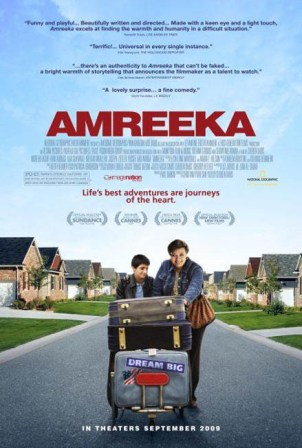
AMREEKA
Canada/US, 2009, 96 minutes. Colour.
Nisreen Faour, Melkar Muallem, Alia Shawkat, Hiam Abbass, Yussuf Abu- Warda, Joseph Ziegler.
Directed by Cherien Dabis.
Amreeka is the Arabic word for America. It is seen written on the walls of buildings in Palestine.
The director was born in Canada but has an Arab background. She has written the screenplay as well as directing the film.
The story is set in 2003. The film focuses on a mother, Nisreen Faour, who works at a bank, pays for her son to go to a private school, is separated from her husband. The boy is very supportive of his mother. When she finds she has gained a visa for the United States, they decide to go. She leaves her family, especially her critical mother. They are to join her sister and her family in Illinois.
The film focuses on the experience of Palestinians, especially in crossing the borders into Israel, the severity and the humiliations. However, once mother and son arrive in the United States, they are subjected to some harassment, misunderstanding of words, and the confiscation of their tin of cookies (which, unfortunately, contained all their savings).
While they are welcomed by the sister, she still pines for Palestine after fifteen years. Her husband is a local doctor. Her children are very Americanised at the local high school. Set at the time of the Iraqi invasion, the film shows how Arab children were bullied and harassed by ignorant Americans. The film also shows the difficulties in getting a job, the mother with her two degrees in fifteen years in banking, finally having to work at a White Castle diner.
The film is well acted, elicits audience sympathy, places American ignorance in a critical light, a challenge for presuppositions about Arabs, especially after September 11, 2001.
There are the usual difficulties at home, financial, the doctor losing his patients through bigotry, the youngsters taking on drugs and staying out, but the film also shows a sympathetic teacher, Joseph Ziegler, and ends on a note of hope. The film won the FIPRESCI prize at the Directors’ Fortnight at the 2009 Cannes Film Festival.
1. Contemporary issues? Palestine, Israel, borders, the post-9/11 atmosphere, fear of Arabs, fear of Islam, the United States in the face of these fears?
2. Life in Palestine, housing, schooling, banks? Travel across the borders? Humiliations? The contrast with the United States, Illinois, the town, the school, White Castle diner, the comparisons of the two worlds? The musical score?
3. The title, the Arabic for America?
4. Muna and her life, life in Palestine, her background, separation from her husband, bringing up her son, educating him at the good school, her work in the bank, the different jobs, the fan blowing her papers, requests for loans? The travelling across the border, the interrogations, the intimidation? Her mother at home, the criticism? The wider family? Her desperation?
5. Muna and her getting the visa, her joy, her hopes, collecting Fadi, at school, the discussion, the hopes?
6. The farewell, her mother’s reaction, travelling to the United States, the arrival?
7. America after 9/11, the caution about Arabs, the behaviour at passport control, customs, the misunderstandings of language like ‘occupation’? the examination of the baggage? The confiscation of the tin? The irony of Muna later realising that the money had all disappeared in the tin where she had put for safety? Fadi and his letting it go?
8. Raghda and her welcoming her sister, her husband, living in the United States for years, yet still pining for Palestine? Her lifestyle, the home, financial difficulties? The doctor, sympathetic? The children? The doctor, his patients, the financial difficulties, yet sharing the house with Muna and her son? Hospitality?
9. Muna and her expectations, going to the school, the enrolment of her son, his acceptance? In the classroom, the snide remarks of the students, about suicide bombs, the bullying, the fight and Muna called in to the school?
10. Muna and the issue of money, her pride, searching for the job, the phone calls, the newspapers, the refusals? Going to the diner, pretending to work at the bank, being dropped off, the woman at the bank helping her with the deceit? Coming to get her at the diner to go the school for Fadi? Muna and her gratitude, putting her account in that bank?
11. Muna at work, the boss, the language and accent, the boy with the earring, the customers, the bullying boys and the attack? Their slinging off at Muna?
12. The sympathetic teacher, his story, marriage break-up, helping, his attraction towards Muna, Fadi and the fight, going to the diner, the meals, helping her to acknowledge the truth? Meeting her, going to the picnic?
13. The crisis at home, Raghda and her continual yearning for Palestine, the doctor and his having to deal with the situation?
14. The kids, going out, smoking pot, the rebellion? Especially the daughter?
15. The family discovering Muna’s job, accepting it, Muna helping with the money? Their gratitude?
16. The picnic – the sudden ending – but hopeful?